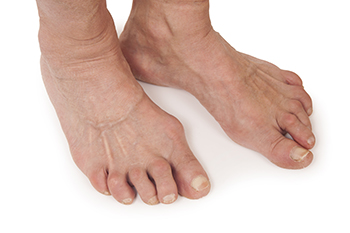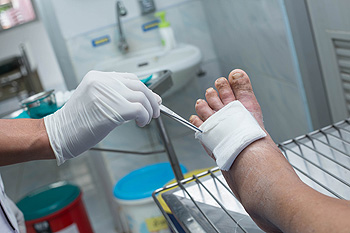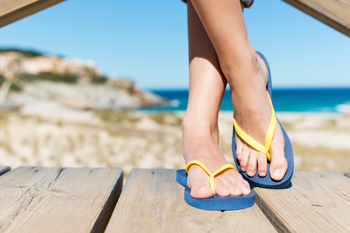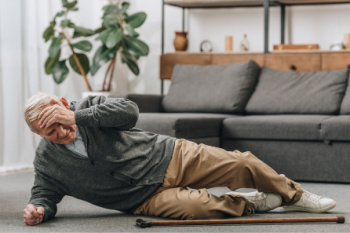Connect With Us
Blog
Items filtered by date: June 2024
Why Live with Pain and Numbness in Your Feet?
How Rheumatoid Arthritis Affects the Feet

Rheumatoid arthritis, or RA, profoundly affects the feet, leading to significant discomfort and mobility issues. The inflammation caused by RA targets the joints, resulting in pain, swelling, and stiffness, particularly in the toes and the balls of the feet. This inflammation can damage the cartilage and bones over time, causing deformities such as hammertoes and bunions. The pain and swelling often make walking difficult and can lead to a reduced range of motion. Additionally, the arches of the feet may flatten, altering gait and balance. Effective management of RA in the feet involves a combination of medications to control inflammation and supportive footwear to reduce pressure on affected areas. If you have pain in your feet and toes, it is suggested that you confer with a podiatrist who can accurately diagnose and help you manage RA or whatever might be going on.
Because RA affects more than just your joints, including the joints in your feet and ankles, it is important to seek early diagnosis from your podiatrist if you feel like the pain in your feet might be caused by RA. For more information, contact Imaze Marian Davis, DPM of Marian Davis, DPM, PA. Our doctors will assist you with all of your podiatric concerns.
What Is Rheumatoid Arthritis?
Rheumatoid Arthritis (RA) is an autoimmune disorder in which the body’s own immune system attacks the membranes surrounding the joints. Inflammation of the lining and eventually the destruction of the joint’s cartilage and bone occur, causing severe pain and immobility.
Rheumatoid Arthritis of the Feet
Although RA usually attacks multiple bones and joints throughout the entire body, almost 90 percent of cases result in pain in the foot or ankle area.
Symptoms
- Swelling and pain in the feet
- Stiffness in the feet
- Pain on the ball or sole of feet
- Joint shift and deformation
Diagnosis
Quick diagnosis of RA in the feet is important so that the podiatrist can treat the area effectively. Your doctor will ask you about your medical history, occupation, and lifestyle to determine the origin of the condition. Rheumatoid Factor tests help to determine if someone is affected by the disease.
If you have any questions please feel free to contact our office located in Miami, FL . We offer the newest diagnostic and treatment technologies for all your foot and ankle needs.
Dealing With Diabetic Foot Ulcers

Diabetic foot ulcers pose a significant risk to individuals with diabetes, often occurring on the ball of the foot or the bottom of the big toe. While some foot ulcers may not cause pain, it's important to seek immediate medical attention, as neglecting them can lead to infections and potential limb loss. Treatment approaches vary depending on the severity of the diabetic foot ulcer. Among them are X-rays to assess bone health and debridement, or cleaning out dead tissue, which may require hospitalization. Special footwear or braces may be recommended to protect the foot and aid healing. In cases of poor circulation, consultation with a vascular surgeon may be necessary. Even after an ulcer heals, ongoing care is vital to prevent recurrence, including the use of specialized footwear and daily foot monitoring for any sores or trouble spots. Individuals with diabetes face a higher risk of amputation, due to complications like peripheral artery disease and neuropathy, but limb loss can be prevented with regular foot care, proper medical supervision, and suitable footwear. Dealing with diabetic foot ulcers includes having a podiatrist as a member of your healthcare team. For help with foot ulcers, it is suggested that you make an immediate appointment with a podiatrist for care.
Diabetic foot care is important in preventing foot ailments such as ulcers. If you are suffering from diabetes or have any other concerns about your feet, contact Imaze Marian Davis, DPM from Marian Davis, DPM, PA. Our doctors can provide the care you need to keep you pain-free and on your feet.
Diabetic Foot Care
Diabetes affects millions of people every year. The condition can damage blood vessels in many parts of the body, especially the feet. Because of this, taking care of your feet is essential if you have diabetes, and having a podiatrist help monitor your foot health is highly recommended.
The Importance of Caring for Your Feet
- Routinely inspect your feet for bruises or sores.
- Wear socks that fit your feet comfortably.
- Wear comfortable shoes that provide adequate support.
Patients with diabetes should have their doctor monitor their blood levels, as blood sugar levels play such a huge role in diabetic care. Monitoring these levels on a regular basis is highly advised.
It is always best to inform your healthcare professional of any concerns you may have regarding your feet, especially for diabetic patients. Early treatment and routine foot examinations are keys to maintaining proper health, especially because severe complications can arise if proper treatment is not applied.
If you have any questions please feel free to contact our office located in Miami, FL . We offer the newest diagnostic and treatment technologies for all your foot and ankle needs.
Flip-Flops and the Feet
 While flip-flops may signal the arrival of sunny summer days, they can also pose risks to foot health. These seemingly carefree shoes offer minimal support and protection, potentially leading to various foot problems. The lack of arch support and cushioning in flip-flops can alter the way people walk, causing them to grip the sandals with their toes, leading to strain and fatigue. This altered gait can also impact other parts of the body, potentially causing knee, hip, or back pain. If you opt for flip-flops, choose high-quality leather shoes that offer better support and durability. Ensure they fit well and reserve them for short periods or casual occasions. If you experience discomfort or have issues from wearing flip-flops, it is suggested that you consult a podiatrist for individualized treatment and advice on appropriate footwear choices for optimal foot health.
While flip-flops may signal the arrival of sunny summer days, they can also pose risks to foot health. These seemingly carefree shoes offer minimal support and protection, potentially leading to various foot problems. The lack of arch support and cushioning in flip-flops can alter the way people walk, causing them to grip the sandals with their toes, leading to strain and fatigue. This altered gait can also impact other parts of the body, potentially causing knee, hip, or back pain. If you opt for flip-flops, choose high-quality leather shoes that offer better support and durability. Ensure they fit well and reserve them for short periods or casual occasions. If you experience discomfort or have issues from wearing flip-flops, it is suggested that you consult a podiatrist for individualized treatment and advice on appropriate footwear choices for optimal foot health.
Flip-flops can cause a lot of problems for your feet. If you have any concerns about your feet or ankles, contact Imaze Marian Davis, DPM from Marian Davis, DPM, PA. Our doctors will assist you with all of your foot and ankle needs.
Flip-Flops and Feet
Flip-flops have managed to become a summer essential for a lot of people. While the shoes may be stylish and easy to slip on and off, they can be dangerous to those who wear them too often. These shoes might protect you from fungal infections such as athlete’s foot, but they can also give you foot pain and sprained ankles if you trip while wearing them.
When Are They Okay to Wear?
Flip-flops should only be worn for very short periods of time. They can help protect your feet in places that are crawling with fungi, such as gym locker rooms. Athlete’s foot and plantar warts are two common fungi that flip-flops may help protect your feet against.
Why Are They Bad for My Feet?
These shoes do not offer any arch support, so they are not ideal for everyday use. They also do not provide shock absorption or heel cushioning which can be problematic for your feet. Additionally, you may suffer from glass cuts, puncture wounds, and stubbed toes since they offer little protection for your feet.
More Reasons Why They Are Bad for Your Feet
- They Slow You Down
- May Cause Blisters and Calluses
- Expose Your Feet to Bacteria
If you have any questions, please feel free to contact our office located in Miami, FL . We offer the newest diagnostic and treatment technologies for all your foot care needs.
Safeguarding Older Adults from Tumbles

As individuals age, the risk of experiencing a fall increases, posing significant threats to their health and independence. Understanding the factors that contribute to falls is vital in implementing preventive measures. Common risk factors for falling in older people include muscle weakness, balance impairment, vision problems, and certain medications that may cause dizziness or lightheadedness. Environmental hazards, such as uneven surfaces, poor lighting, or slippery floors also heighten the risk. Fortunately, proactive steps can be taken to reduce the likelihood of falls. Engaging in regular exercise to improve strength, balance, and flexibility can enhance stability and coordination. Conducting home safety assessments and making necessary modifications can help create a safer living environment. Included are installing grab bars, securing rugs, and improving lighting. Regular vision check-ups and medication reviews with healthcare providers help decrease potential risks. Falling can seriously impact the feet as well as other body parts. If this has happened to you, it is suggested that you visit a podiatrist who can assess your foot condition, provide treatment, and offer you effective fall-prevention techniques.
Preventing falls among the elderly is very important. If you are older and have fallen or fear that you are prone to falling, consult with Imaze Marian Davis, DPM from Marian Davis, DPM, PA. Our doctors will assess your condition and provide you with quality advice and care.
Every 11 seconds, an elderly American is being treated in an emergency room for a fall related injury. Falls are the leading cause of head and hip injuries for those 65 and older. Due to decreases in strength, balance, senses, and lack of awareness, elderly persons are very susceptible to falling. Thankfully, there are a number of things older persons can do to prevent falls.
How to Prevent Falls
Some effective methods that older persons can do to prevent falls include:
- Enrolling in strength and balance exercise program to increase balance and strength
- Periodically having your sight and hearing checked
- Discuss any medications you have with a doctor to see if it increases the risk of falling
- Clearing the house of falling hazards and installing devices like grab bars and railings
- Utilizing a walker or cane
- Wearing shoes that provide good support and cushioning
- Talking to family members about falling and increasing awareness
Falling can be a traumatic and embarrassing experience for elderly persons; this can make them less willing to leave the house, and less willing to talk to someone about their fears of falling. Doing such things, however, will increase the likelihood of tripping or losing one’s balance. Knowing the causes of falling and how to prevent them is the best way to mitigate the risk of serious injury.
If you have any questions, please feel free to contact our office located in Miami, FL . We offer the newest diagnostic and treatment technologies for all your foot care needs.


